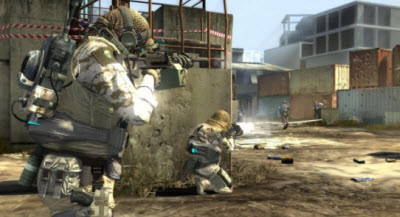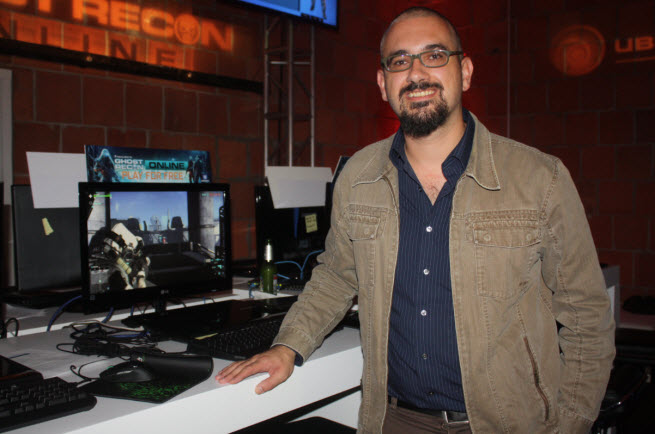Ubisoft recently launched Ghost Recon Online into its open beta test, a brave step into the world of high-quality free-to-play games. Now the company is readying a new expansion, dubbed Artic Pack. It shows that the French video game publisher isn’t just doing a fire-and-forget strategy with the online shooter gmae.
As a squad-based combat game, Ghost Recon Online is part of a larger franchise blitz by the French company. Ubisoft launched its Ghost Recon: Future Soldier high-end game for the consoles and PC in May, and it also launched a low-end 2D game on Facebook, Ghost Recon Commander, which has also seen its formal launch. These are part of Ubisoft’s “companion game” strategy, where Ubisoft delivers its top franchises to gamers wherever and whenever they like it.
We caught up with Theo Sanders, the creative director of Ghost Recon Online for Ubisoft Singapore. Here’s a transcript of our interview.
GamesBeat: Can you update us on how Ghost Recon Online’s progressed or changed?
Theo Sanders: Sure. Here’s a little background on what we’re showing today. We’ve already had the game in open beta for one month now. We’re reacting to some of the first community feedback we’ve had. On September 12, we’re launching the first expansion pack for the game. We’re calling it the Arctic Pack.
 GamesBeat: How do you get that? Is that something you buy?
GamesBeat: How do you get that? Is that something you buy?
Sanders: No, it’s a free expansion. The map will automatically download, and then all the items we’re shipping with the map are available either with the free in-game earned currency, or with the premium one. Same as the existing items. It’s really our first opportunity to react to what we’ve learned from our open beta. It’s a nuclear decommissioning plant set in the northern Arctic wastes of Russia. So it’s a snowy map. Obviously, we’re releasing a whole set of new guns and new armor that fit that theme. Right now we’re in a wide open beta in 40 countries, North America and Europe.
GamesBeat: When you buy something in the game, what’s the transaction amount? Do you start at a certain dollar value or something like that?
Sanders: There’s 307 separate items in the game — 306 of those 307 you can buy them with the earned currency.
GamesBeat: Do you buy them one at a time, or in packs or anything like that?
Sanders: Let me show you here. For example, with my gun…the RP is the earned currency, and this here is the premium one. So you can save yourself time. That’s true for every item in the game. This here is a low-level gun. It represents about…50 cents, roughly, of real currency.
GamesBeat: What have you noticed about the players in the beta? How have people behaved?
Sanders: Overall, it’s been pretty smooth. We were in closed beta for over a yeah, so we already had a lot of expectations about what the initial reactions would be. One difference we’ve noticed is that closed betas tend to attract a more hardcore kind of player. They need a little less introduction to the game mechanics. They generally figure things out very quickly. With an open beta, you’re welcoming a much broader audience, and we’ve realized the need to make some of the core game systems a little bit easier to get into for new players. That’s one of our big focuses right now, with all the balance tuning. In this expansion, besides the map and the new weapons, we’re introducing something like 400 different balance changes, tweaks, and bug fixes based on the feedback we’ve had so far from the open beta.
GamesBeat: How long did it take you to put this pack together?
Sanders: We’ve been working on it for about two months now. Some of the things, like the map itself, have obviously been in production for a little longer. But we’ve also been able to incorporate a lot of the early open beta feedback we had in the first two weeks.
GamesBeat: Do you have a good idea yet of your pace for expansions? Are you going to do eight of these a year or something? Any sense of timing?
Sanders: Right now we’re shooting for a monthly update of some sort. It won’t always be a map. It might be some other new content, like weapons, or general balance-type features. But if you start going over a month, players start getting disengaged. It’s a constant process of not just feeding new stuff, but also iterating on the things you already have.
GamesBeat: Is there a way that this is a companion title with any others?
Sanders: We’re in the process of working on integration with Ghost Recon: Commander. It’s nice, because this obviously occupies the time of day after work, after school. You’re sitting at a big screen like this. It occupies all your attention. You don’t really have the option to spend five minutes on the bus or 10 minutes when you’re supposed to be working interacting with this game.
GamesBeat: You might earn rewards here for Ghost Recon: Commander, or vice versa?
Sanders: Yeah, that’s exactly the type of thing we’re working on.
GamesBeat: What about with Future Soldier? Is there any relationship there as well?
Sanders: We offer the Future Soldier players on PC some special rewards for playing Ghost Recon Online, yeah.
GamesBeat: Have you noticed a lot of crossover?
Sanders: I think so. I think to an extent there are just people who are interested in exploring everything the brand has to offer. There is a gap between this and people who prefer playing with a game pad on a console, though. Or there are people who prefer the user experience of one or the other. They offer the whole kitchen-sink extravagant Hollywood experience. This is more about a long-term process, with players slowly evolving in the game. It’s a different way to experience it.
GamesBeat: Is there any worry that this game might get too good over time?
Sanders: [Laughs] I hope so!
GamesBeat: Future Soldier might not seem as interesting….
Sanders: Well, I think in many ways the two complement each other. They offer different takes on the franchise. Over 10 years, gamers have expressed very clearly that they like the general gameplay of Ghost Recon. A bit slower, a bit more tactical. A lot of depth to the customization and the weapon progression. That’s something both Future Soldier and Ghost Recon Online have in common. How they differ is in the type of experience you can have playing them. Ghost Recon Online is much more about you and your friends engaging with the developer and the community. You slowly see the game evolve in ways that you participate in. Future Soldier is a very pure form of entertainment. It’s sitting down and getting entertained for 10 hours, 20 hours, by a bunch of game developers.
GamesBeat: And you’re more likely to play Future Soldier with your real-world friends, as opposed to playing with strangers in something like this?
Sanders: One of the things that’s great about an online title in general is that it’s so accessible for your friends to come in. If you have a good experience, there’s no need for your friend to go to the store. There’s no barrier to entry at all. You can literally be one text message and maybe half an hour away from them being in the game with you. In some sense I think online games are actually more social than console games.
GamesBeat: You haven’t really marketed it too much. It’s been kind of quiet. Will there be some promotion that will start now?
Sanders: We’ve been doing a little bit of marketing. We had an open beta launch announcement at the beginning of the month. But overall, we’re hoping to really organically grow the game. We’re in this for the long haul. I think the approach to take there is not the big bang marketing blitz on day one. You slowly build and iterate with the community, so when new players come in as you go along, they find an even better game than what we have today.
GamesBeat: Is it final, at some point? Do you see that someday? Outside of beta, I mean.
Sanders: There will be a final at some stage. It’s a little bit hard to articulate what “final” means in this space. Obviously this is already a monetized game in the open beta phase. But I think for me, it means a game that has a very broad appeal. We started with the core feature set and a core set of content. Different players have different needs. If you’re shipping a retail game, you need to have everything to compete. Co-op, multiplayer, PvP…we’re looking at some of those bigger, broader-based features to really celebrate a big final release.
VentureBeat's mission is to be a digital town square for technical decision-makers to gain knowledge about transformative enterprise technology and transact. Learn More

